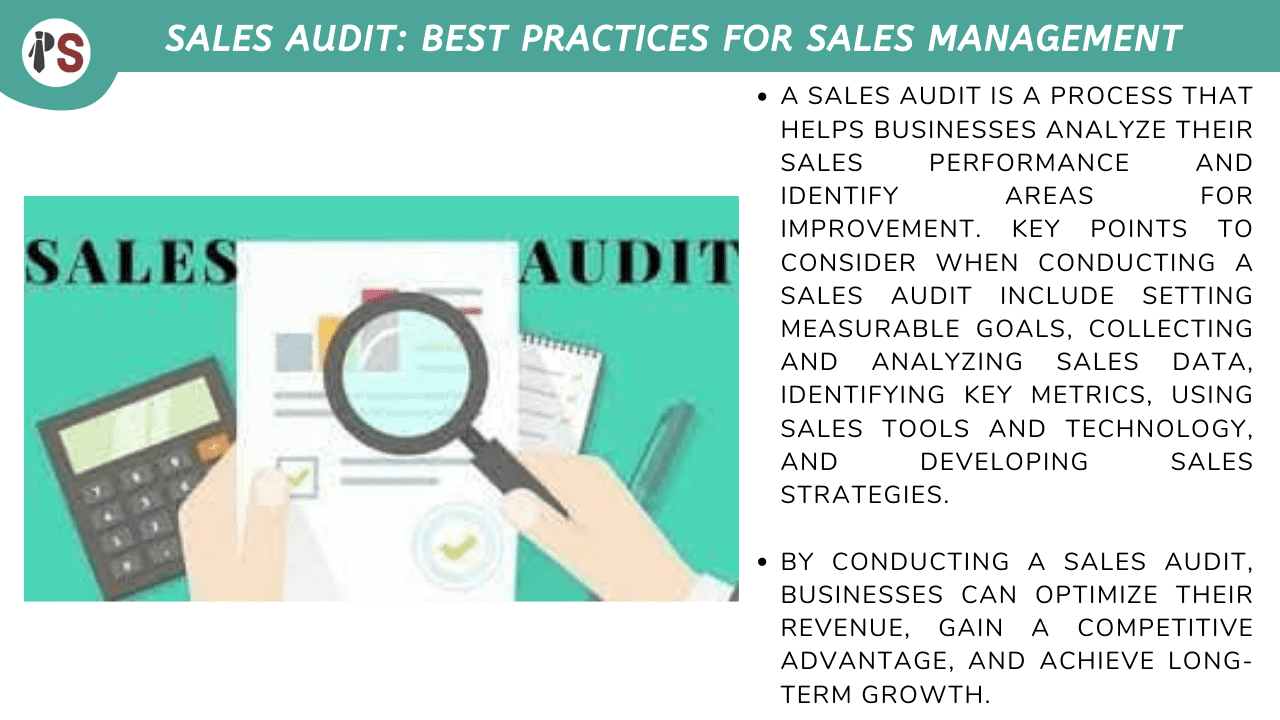
Sales are the lifeblood of any business, and managing sales is crucial to ensuring that your business is successful. One way to do this is through conducting regular sales audits. A sales audit is a process of reviewing and analyzing your sales data to identify areas where you can improve your sales performance. In this blog post, we will discuss the best practices for sales management and how to conduct a successful sales audit.
A sales audit helps you identify areas where you can improve your sales performance. By analyzing your sales data, you can identify trends, opportunities, and potential issues that could be impacting your sales. This information can then be used to develop a plan to improve your sales performance and grow your business.
Set Clear Sales Goals: Setting clear sales goals is the first step in managing your sales. Your sales goals should be specific, measurable, achievable, relevant, and time-bound. This will help you focus your sales efforts and ensure that everyone in your sales team is working towards the same objectives.
Train Your Sales Team: Providing your sales team with training and resources is essential to their success. Ensure that your sales team has a thorough understanding of your products or services, the sales process, and how to handle objections. Regular training sessions and workshops can help keep your sales team motivated and up-to-date with the latest sales techniques.
Monitor Sales Performance: Monitoring your sales performance is crucial to identifying areas for improvement. Use sales metrics such as conversion rates, average order value, and customer lifetime value to measure your sales performance. These metrics can help you identify trends, opportunities, and potential issues in your sales process.
Regularly Review Sales Data: Regularly reviewing your sales data is critical to identifying areas for improvement. Analyze your sales data to identify trends, opportunities, and potential issues in your sales process. Use this information to develop a plan to improve your sales performance.
Use Sales Automation Tools: Using sales automation tools such as customer relationship management (CRM) software can help you manage your sales process more efficiently. These tools can help you manage your leads, automate your sales process, and track your sales data more effectively.
Define Your Objectives: The first step in conducting a sales audit is to define your objectives. What do you want to achieve from the sales audit? Identify the key areas you want to focus on, such as sales performance, sales process, or customer acquisition.
Collect Sales Data: Collect all relevant sales data, including sales reports, customer feedback, and customer demographics. Ensure that your data is accurate, up-to-date, and comprehensive.
Analyze Your Sales Data: Analyze your sales data to identify trends, opportunities, and potential issues. Use sales metrics such as conversion rates, average order value, and customer lifetime value to measure your sales performance.
Identify Areas for Improvement: Based on your analysis, identify areas for improvement. This could include improving your sales process, increasing customer retention, or developing new sales strategies.
Develop an Action Plan: Develop an action plan to address the areas for improvement identified in your sales audit. This plan should include specific goals, timelines, and responsibilities.
Implement Your Action Plan: Implement your action plan, and monitor your progress regularly. Use sales metrics to track your progress and adjust your strategy as needed.
Conducting regular sales audits is essential to improving your sales performance and growing your business. By following the best practices for sales management and conducting a successful sales audit, you can identify areas for improvement, develop an action plan, and implement strategies to achieve your sales goals. Remember, sales are the lifeblood of any business, so it's crucial to manage them effectively.
At Professional Saathi, we offer a range of business consultancy services that help businesses improve their performance, achieve growth, and overcome challenges.
Copyright 2026 © Created By KTPG PROFESSIONAL SAATHI CORPORATE CONSULTANT PRIVATE LIMITED, All Rights Reserved.
Leave Your Comment